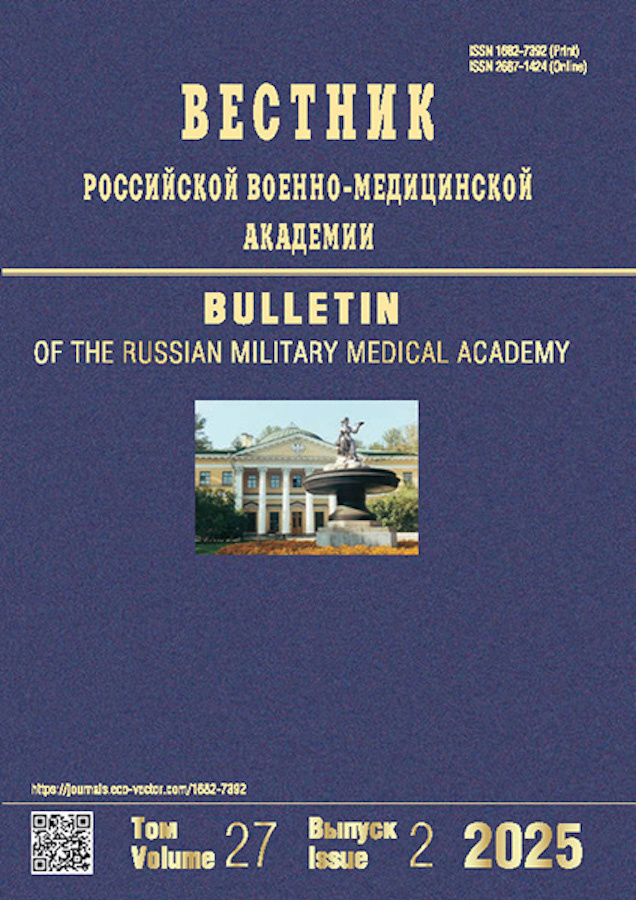Оценка влияния антицитокиновой терапии во время острого периода новой коронавирусной инфекции на течение ишемической болезни сердца
- Авторы: Литвиненко Р.И.1, Крюков Е.В.1, Язенок А.В.1, Гайдук С.В.1
-
Учреждения:
- Военно-медицинская академия имени С.М. Кирова
- Выпуск: Том 27, № 2 (2025)
- Страницы: 185-192
- Раздел: Оригинальное исследование
- Статья получена: 30.01.2025
- Статья одобрена: 25.03.2025
- Статья опубликована: 23.06.2025
- URL: https://journals.eco-vector.com/1682-7392/article/view/649332
- DOI: https://doi.org/10.17816/brmma649332
- EDN: https://elibrary.ru/JHMFYJ
- ID: 649332
Цитировать
Аннотация
Обоснование. Результаты современных исследований показывают наличие причинно-следственной связи между воспалением и течением атерогенеза и ишемической болезнью сердца. Новую коронавирусную инфекцию зачастую сопровождало развитие «цитокинового шторма». Для его купирования использовали различные варианты антицитокиновой терапии, при этом последствия их применения на течение ишемической болезни сердца в дальнейшем не оценивали.
Цель — изучить влияние различных вариантов антицитокиновой терапии в период острого заболевания новой коронавирусной инфекцией на течение ишемической болезни сердца в постковидном периоде.
Материалы и методы. Обследованы 272 пациента с ранее верифицированной ишемической болезнью сердца, получавшие различные варианты антицитокиновой терапии во время новой коронавирусной инфекции. После перенесенной новой коронавирусной инфекции проведено повторное обследование, и на основании критериев ухудшения пациенты были разделены на две группы (с ухудшением и без ухудшения течения ишемической болезни сердца) для последующего сравнения течения этой болезни.
Результаты и их обсуждение. Ухудшение течения ишемической болезни сердца было значимо связано со степенью тяжести новой коронавирусной инфекции (χ2df = 2 = 28,406; р < 0,0001) и полом (у мужчин — χ2df = 1 = 7,310; р = 0,007). У пациентов, перенесших новую коронавирусную инфекцию тяжелой степени и получавших комбинированную антицитокиновую терапию во время острого периода новой коронавирусной инфекции, была меньшая вероятность ухудшения течения ишемической болезни сердца по сравнению с монотерапией «цитокинового шторма» (р1,4 = 0,016; p3,4 = 0,024). Предложена модель, которая на основании половой принадлежности, возраста, тяжести перенесенной новой коронавирусной инфекции и проводимой терапии позволяет с точностью 68,8% предсказать течение ишемической болезни сердца после новой коронавирусной инфекции.
Заключение. Полученные результаты подтверждают значимость воспаления в течении ишемической болезни сердца, а также влияния тяжести, перенесенной новой коронавирусной инфекции, на ее течение. Использование комбинированной терапии «цитокинового шторма», возникающего при новой коронавирусной инфекции у пациентов, страдающих ишемической болезнью сердца, ассоциировано с лучшим прогнозом ее течения.
Полный текст
Об авторах
Руслан Игоревич Литвиненко
Военно-медицинская академия имени С.М. Кирова
Автор, ответственный за переписку.
Email: vmeda-nio@mil.ru
ORCID iD: 0000-0001-8435-9958
SPIN-код: 8981-4000
канд. мед. наук
Россия, Санкт-ПетербургЕвгений Владимирович Крюков
Военно-медицинская академия имени С.М. Кирова
Email: vmeda-nio@mil.ru
ORCID iD: 0000-0002-8396-1936
SPIN-код: 3900-3441
д-р мед. наук, профессор
Россия, Санкт-ПетербургАркадий Витальевич Язенок
Военно-медицинская академия имени С.М. Кирова
Email: vmeda-nio@mil.ru
ORCID iD: 0000-0002-1334-8191
SPIN-код: 4107-1280
д-р мед. наук, доцент
Россия, Санкт-ПетербургСергей Валентинович Гайдук
Военно-медицинская академия имени С.М. Кирова
Email: gaiduksergey@mail.ru
ORCID iD: 0000-0003-1524-9493
SPIN-код: 8602-4922
д-р мед. наук, доцент
Россия, Санкт-ПетербургСписок литературы
- Gumilevskiy BYu, Moskalev AV, Gumilevskay OP, et al. Features of immunopathogenesis of a new coronavirus infection. Bulletin of the Russian Military Medical Academy. 2021;23(1):187–198. doi: 10.17816/brmma.63654 EDN: XYIVAY
- Zaitsev AA, Chernov SA, Kryukov EV, et al. Practical experience in managing patients with the new coronavirus infection COVID-19 in a hospital (preliminary results and recommendations). Attending Physician. 2020;6: 74–79. (In Russ.) doi: 10.26295/OS.2020.41.94.014 EDN: SVXAJC
- Andreenko AA, Andreichuk YuV, Arsent’ev VG, et al. The infection caused by SARS-COV-2. EV Kryukov, editor. Saint Petersburg; 2023. 260 p. EDN: QFKFPFCOVID-19 (In Russ.)
- Tsybulkin NA, Tukhvatullina GV, Tsybulkina VN, Abdrakhmanova A.I. Inflammatory mechanisms in the pathogenesis of atherosclerosis. Practical medicine. 2016;(4-2):165–169. EDN: WKBHFJ
- De Stefano L, Bobbio-Pallavicini F, Manzo A, et al. A “window of therapeutic opportunity” for anti-cytokine therapy in patients with coronavirus disease 2019. Front Immunol. 2020;11:572635. doi: 10.3389/fimmu.2020.572635
- Sukhomlinova IM, Bakulin IG, Kabanov MYu. Predicting the efficacy of anti-inflammatory therapy in COVID-19. RMJ. 2023;(2):72–76. EDN: QVFSKR
- Bunova SS, Okhotnikova PI, Skirdenko YuP, et al. COVID-19 and cardiovascular comorbidity: novel approaches to reduce mortality. Cardiovascular Therapy and Prevention. 2021;20(4):122–128. doi: 10.15829/1728-8800-2021-2953 EDN: WOPWRT
- Tajmirriahi M, Sami R, Mansourian M, et al. The clinical manifestation and outcome of COVID-19 in patients with a history of ischemic heart disease; a retrospective case-control study. BMC Cardiovascular Disorder. 2023;23:241 doi: 10.1186/s12872-023-03256-1
- Sholter DE, Armstrong PW. Adverse effects of corticosteroids on the cardiovascular system. Can J Cardiol. 2000;16(4):505–511.
- Deng H-W, Mei W-Y, Xu Q, et al. The role of glucocorticoids in increasing cardiovascular risk. Front Cardiovasc Med. 2023;10:1187100. doi: 10.3389/fcvm.2023.1187100
- Dzherieva IS, Volkova NI, Davidenko IY, et al. Glucocorticoid therapy is a risk factor for cardiovascular diseases. Medical Herald of the South of Russia. 2022;13(3):93–106. doi: 10.21886/2219-8075-2022-13-3-93-106 EDN: UTOFEY
- Belletti A, Campochiaro C, Marmiere M, et al. Efficacy and safety of IL-6 inhibitors in patients with COVID-19 pneumonia: a systematic review and meta-analysis of multicentre, randomized trials. Ann Intensive Care. 2021;11:152. doi: 10.1186/s13613-021-00941-2
- Efficacy of interleukin-6 inhibitors as a tool for preventive anti-inflammatory therapy for COVID-19. Good Clinical Practice. 2024;(1):4–16. doi: 10.37489/2588-0519-2024-1-4-16 EDN: DSVZBR
- Popkova TV, Novikova DS, Nasonov EL Interleukin-6 inhibition and cardiovascular disease in patients with rheumatoid arthritis. Therapeutic archive. 2016;88(5):93–101. doi: 10.17116/terarkh201688593-101 EDN: VZBXQN
- Beloglazov VA, Goncharov GS, Shaduro DV. Janus-Kinase inhibitors. Perspective and experience of application in the global clinical practice. TMBV. 2018;21(4):95–104. EDN: ZCQDVJ
- Jain NK, Tailang M, Jain HK, et al. Therapeutic implications of current Janus kinase inhibitors as anti-COVID agents: A review. Front Pharmacol. 2023;14:1135145. doi: 10.3389/fphar.2023.1135145
- Song Y-K, Lee G, Hwang J, et al. Cardiovascular risk of janus kinase inhibitors compared with biologic disease-modifying antirheumatic drugs in patients with rheumatoid arthritis without underlying cardiovascular diseases: a nationwide cohort study. Front Pharmacol. 2023;14:1165711. doi: 10.3389/fphar.2023.1165711
- Shah JT, Shah KT, Femia AN, et al. Cardiovascular risk management in patients treated with janus kinase inhibitors. J Cardiovasc Pharmacol. 2024;83(5):392–402. doi: 10.1097/FJC.0000000000001470









